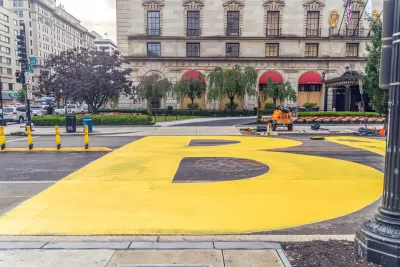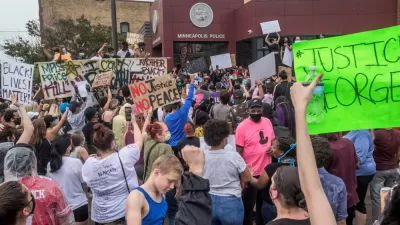Complex political dynamics are mustering for a showdown over D.C.'s comprehensive plan.

Paul Schwartzman reports on the growing coalition fighting for racial equity as Washington, D.C. prepares to consider a comprehensive plan update.
Schwartzman describes the plan as "Mayor Muriel E. Bowser’s proposed changes to zoning policy"—reserving the words "comprehensive plan" for later in the article.
"The revisions would allow taller apartment buildings on key corridors, potentially catalyzing the construction of tens of thousands of housing units, a portion of them subsidized," explains Schwartzman. Moreover, "Under the revised policy, developers would have to devote up to 20 percent of square footage to below-market units — in some cases, more than double the existing requirement."
A key angle of Schwartzman's coverage is the growing awareness of zoning as a racial issue—and the growing work of advocates pushing to allow more space develop in wealthy neighborhoods to right past racial injustices. Like in almost every large city in the United States—not everyone in the District agrees that upzoning is the right tool for racial justice.
“In the name of racial equity, they’re pushing a program that will continue to displace Black people from D.C.,” said Parisa Norouzi, executive director of Empower DC, an advocacy group. “All these people want is to sprinkle the word equitable into things that aren’t equitable. It’s all smoke and mirrors.”
Then there are other opponents, who resist the potential of the zoning changes to change the character of their neighborhoods.
“You’re going to have a serious impact on the character and nature of our community,” Bonnie LePard, a member of the Cleveland Park Historical Society, said at the recent neighborhood meeting, which drew nearly 200 viewers. She added that the new buildings threatened to turn the corridor into a “canyon.”
The article includes a lot more detail about the history of zoning and development in D.C., and the various advocacy organizations working to influence the District's comprehensive plan update process.
FULL STORY: How George Floyd’s death is fueling a push for affordable housing in mostly White parts of D.C.

Planetizen Federal Action Tracker
A weekly monitor of how Trump’s orders and actions are impacting planners and planning in America.

Congressman Proposes Bill to Rename DC Metro “Trump Train”
The Make Autorail Great Again Act would withhold federal funding to the system until the Washington Metropolitan Area Transit Authority (WMATA), rebrands as the Washington Metropolitan Authority for Greater Access (WMAGA).

DARTSpace Platform Streamlines Dallas TOD Application Process
The Dallas transit agency hopes a shorter permitting timeline will boost transit-oriented development around rail stations.

Renters Now Outnumber Homeowners in Over 200 US Suburbs
High housing costs in city centers and the new-found flexibility offered by remote work are pushing more renters to suburban areas.

The Tiny, Adorable $7,000 Car Turning Japan Onto EVs
The single seat Mibot charges from a regular plug as quickly as an iPad, and is about half the price of an average EV.

Supreme Court Ruling in Pipeline Case Guts Federal Environmental Law
The decision limits the scope of a federal law that mandates extensive environmental impact reviews of energy, infrastructure, and transportation projects.
Urban Design for Planners 1: Software Tools
This six-course series explores essential urban design concepts using open source software and equips planners with the tools they need to participate fully in the urban design process.
Planning for Universal Design
Learn the tools for implementing Universal Design in planning regulations.
Municipality of Princeton
Roanoke Valley-Alleghany Regional Commission
City of Mt Shasta
City of Camden Redevelopment Agency
City of Astoria
Transportation Research & Education Center (TREC) at Portland State University
US High Speed Rail Association
City of Camden Redevelopment Agency
Municipality of Princeton (NJ)





























